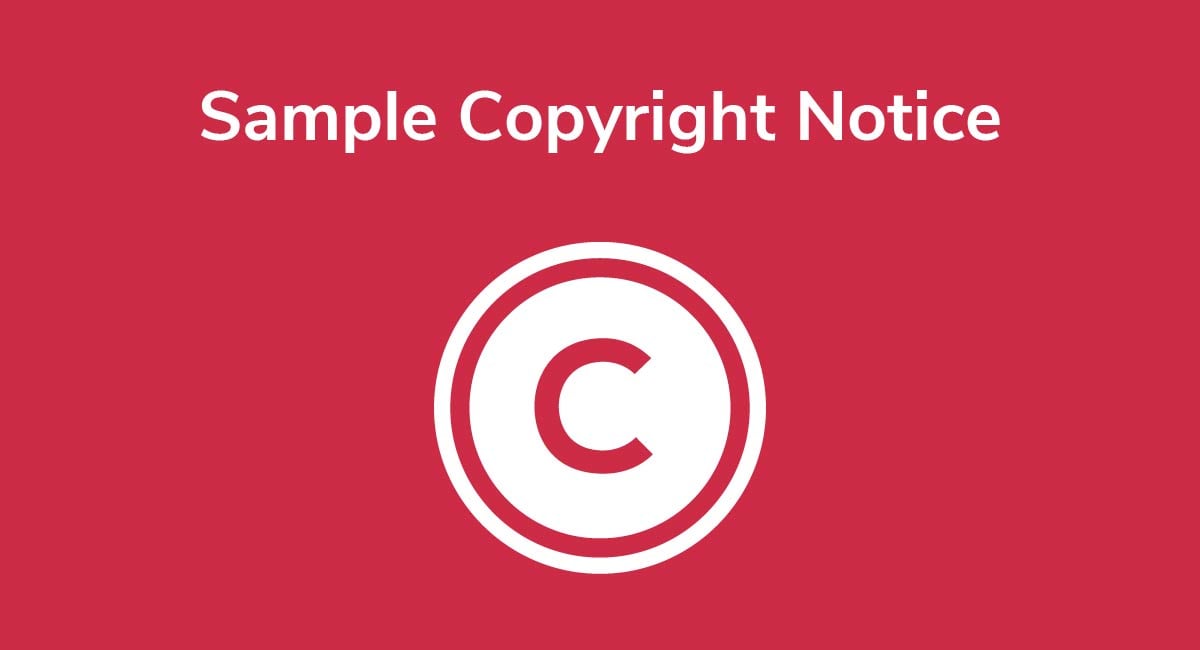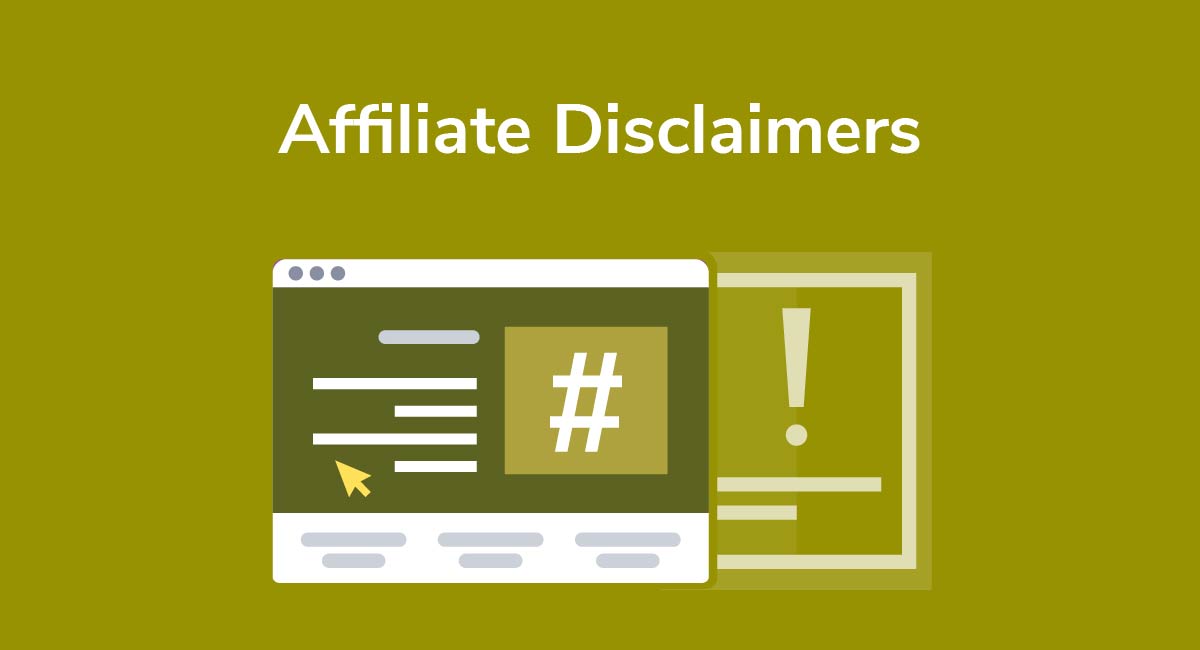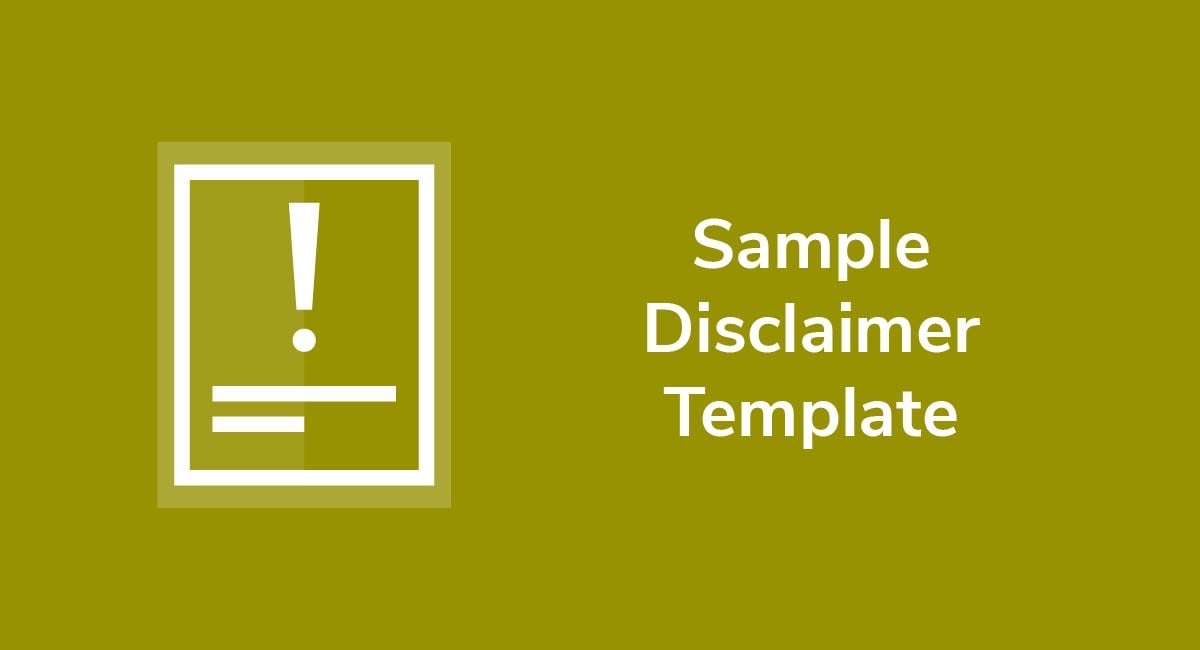Social Media Disclaimers
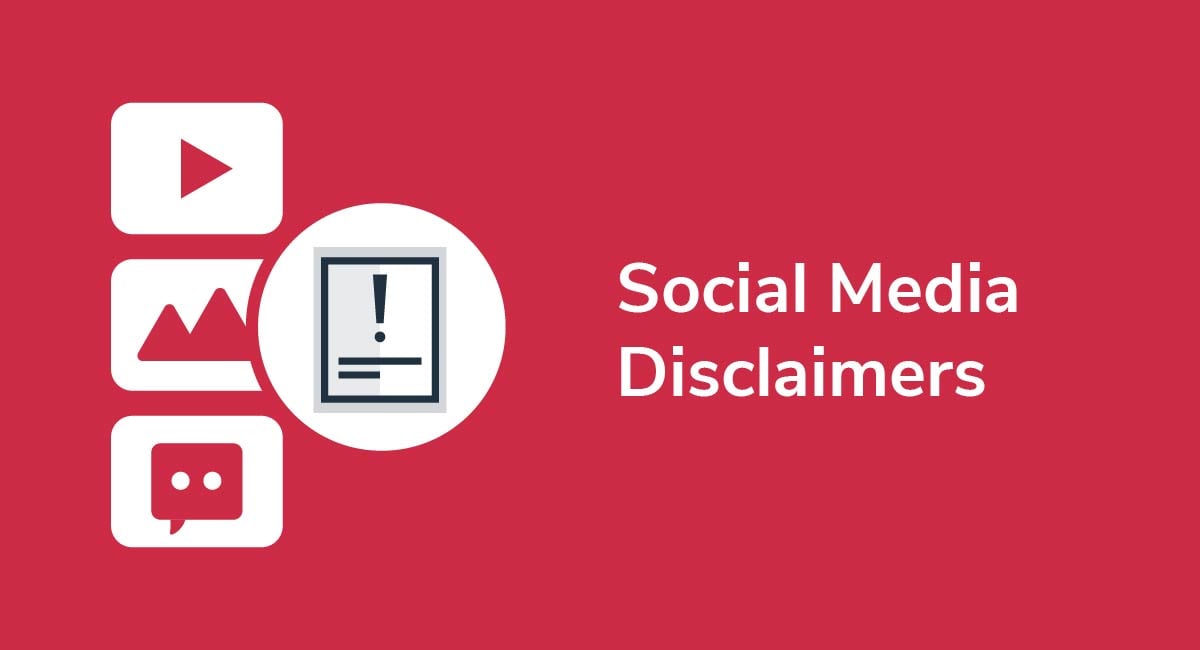
When businesses or employees post on social media, a social media disclaimer can limit liability for the content of each post. While you may not require a disclaimer in all circumstances, they are highly useful from a legal perspective.
Below, we explain how social media disclaimers work, who may benefit from them, and how to write your own legally-enforceable social media disclaimer.
Get compliant today with PrivacyPolicies.com
Select one of our generators to create the required legal agreements for your business:
- Our Privacy Policy Generator can help you generate a customized Privacy Policy in around three minutes, for free.
- Our Terms & Conditions Generator can help you generate a customized Terms & Conditions agreement in around three minutes, for free.
- Our EULA Generator can create a customized End-User License Agreement for your mobile or desktop app.
- Our Cookies Policy Generator can create a customized Cookies Policy to help your compliance with ePrivacy Directive and GDPR.
- Our Disclaimer Generator can create a disclaimer or disclosure for your website.
- Our Return & Refund Policy Generator can help your ecommerce store by creating a returns or refunds policy.
Integrate a free Cookies Notice and Cookie Consent banner to comply with the EU ePrivacy Directive and the new GDPR law regarding cookies.
- 1. What is a Social Media Disclaimer?
- 2. Are Social Media Disclaimers Legally Required?
- 3. Are Social Media Disclaimers Legally Enforceable?
- 4. Why Would You Want a Social Media Disclaimer?
- 5. Who Might Benefit from Social Media Disclaimers?
- 6. What Should a Social Media Disclaimer Contain?
- 6.1. Disclosure of Relationships
- 6.2. Employee Guidelines
- 6.3. No Professional Relationship Established
- 6.4. Limitations on Warranty and Liability
- 7. How Should a Social Media Disclaimer be Displayed?
- 7.1. Alongside a Social Media Post
- 7.2. On a Separate Social Media Disclaimer Page
- 7.3. Within Social Media Profiles
- 8. Summary
What is a Social Media Disclaimer?
A social media disclaimer helps individuals restrict liability for the contents of their social media page. This may include posts, messages, or comments made on other people's profiles.
You can also use disclaimers to put others - such as employees - on notice about their behavior. Disclaimers can let you specify what's considered acceptable and unacceptable conduct on social media, so you can take action against conduct that violates your rules.
Some types of disclaimers you can use include the following:
- Affiliate Disclaimer: Social media influencers and anyone working with brands to promote or endorse a product, should have a disclaimer to this effect. It puts readers on notice that you are paid to promote, review, or discuss a product.
- Legal advice: Lawyers may use disclaimers to ensure that readers know there's no attorney-client relationship created just by reading a law firm's website. A disclaimer can state that the content shared online is not legal advice and should be read purely for information purposes.
- Financial advice: To prevent anyone from acting on information you share about, for example, personal finance issues, you can use a disclaimer to declare that your content cannot be considered financial advice.
- Medical advice: You can use disclaimers to state that information provided is not medical or healthcare advice. This is helpful for anyone in healthcare or a related medical field.
- Views expressed: A disclaimer can state that employee opinions do not reflect the company's own stance and that you waive liability for content shared by employees on social media.
For example, here's an example from Bob and Brad's YouTube channel. The medical disclaimer is short and succinct, stating that the video content is not intended as medical advice. And it's clear that they may receive a commission for any purchases made through affiliate content:
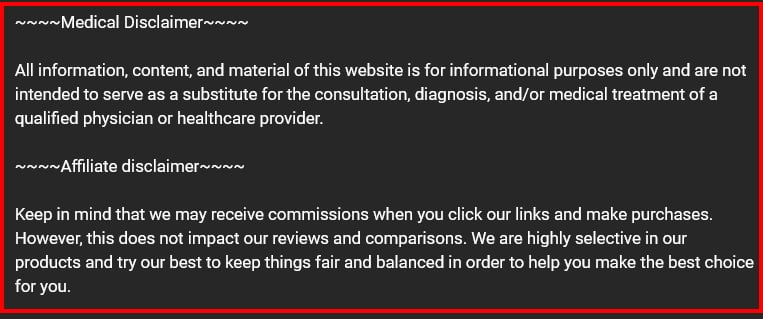
And here's an example of an employee social media disclaimer from the Information Commissioner's Office (ICO) in the UK. It is very clear that employees cannot express opinions on the ICO's behalf, and they can't behave in a way which brings the ICO's reputation into disrepute:
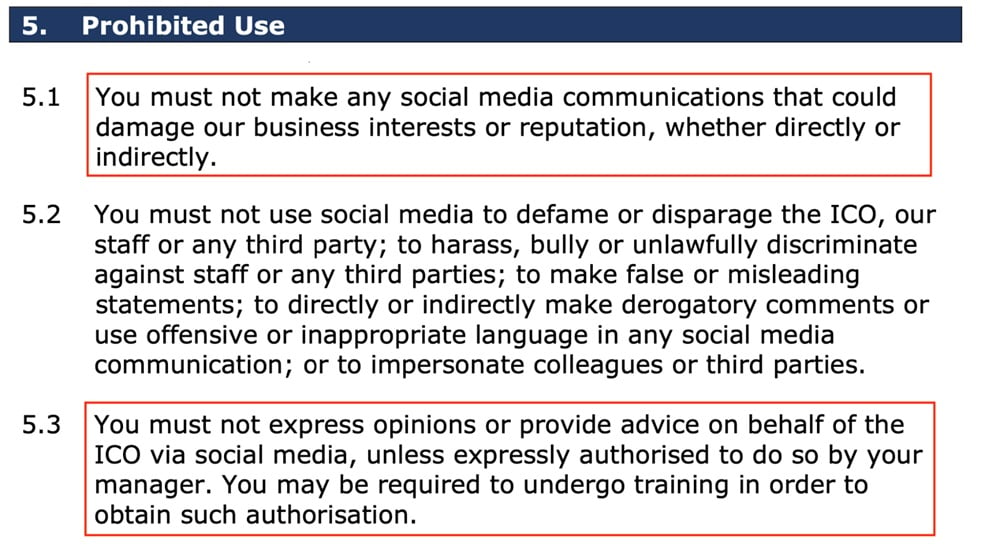
Disclaimers shift some of the responsibility for acting on information shared online to the reader, rather than the content creator. While they're not infallible, they can be useful in legal disputes. And they can serve various purposes, depending on the intended audience.
Are Social Media Disclaimers Legally Required?

No, social media disclaimers are not legally required. However, note that some disclaimers that may be used as social media disclaimers might be legally required in some circumstances. For example, if you engage in affiliate marketing in the U.S., you are required to disclose your affiliate relationship.
Are Social Media Disclaimers Legally Enforceable?

They can be. A social media disclaimer can be legally enforceable if it becomes a contract, or part of a contract. You can improve your disclaimer's enforceability by taking the following actions:
- Make your disclaimer highly visible on your website or social media platform. This includes, for example, displaying it in your footer alongside your other agreements.
- If it's a social media disclaimer for employees, the disclaimer should be part of a wider social use policy. Accepting this policy should be a condition of employment. Employees should understand this before joining your company (or remaining an employee, if the policy comes into force later).
- Use tools such as I Agree checkboxes to ensure acceptance. For example, someone must check a box to say they've read the disclaimer and accept it. You can then proceed on the assumption they have read it, even if they've simply chosen to click the box without reading first.
- If you have a long, stand-alone disclaimer page, include links to this page on your social media platforms and web pages.
As with any contract, no one can be bound by a social media disclaimer if they're unaware of its existence or they have not properly consented to it. Treat your disclaimer like a contract to ensure it's legally binding and enforceable in a legal situation.
Why Would You Want a Social Media Disclaimer?

Here are four key reasons why social media disclaimers can be invaluable.
- Transparency: Disclaimers help readers better understand your social media presence and your business. They provide transparency around what is your opinion and what is an employee's opinion. They also make your expectations clear. Readers know what is expected of them and what is considered unacceptable conduct.
- Clarity: Legal disputes can arise if you take action for unacceptable conduct on social media, if it's not clear that you had the legal right to take this action. For example, if you terminate someone's employment due to their social media content, this could lead to an employment dispute if you don't have a disclaimer in place establishing the rules.
- Trustworthiness: Disclaimers improve your company's reputation. They also give your employees more confidence in how they interact online, because the guidelines are clear.
- Professionalism: Any disclaimer can boost your professional image and web presence. It shows that you take your responsibilities seriously and that you care about the content you or your employees share online.
Given the clear benefits of drafting a social media disclaimer, it simply makes sense to write one. It's also surprisingly simple to create a sufficient social media disclaimer, as we'll cover below.
Who Might Benefit from Social Media Disclaimers?

You may benefit from a social disclaimer if any of the following apply to you:
- You have a social media page for your business
- You have employees and you want to limit liability for their conduct online
- There's a risk of damage from posts made by members of the public or your employees
- There's a chance someone may be hurt or suffer losses if they act on the contents of your social media posts
As most companies have a social media presence, even if it's just one platform, it's worth having a social media disclaimer.
What Should a Social Media Disclaimer Contain?

There's no set format for what a disclaimer should contain. Every disclaimer will be somewhat individualized. However, you can expect social media disclaimers to typically contain the following elements:
- Disclosure of affiliate or sponsor relationships
- Employee guidelines
- No client or patient relationship established
- Warranty against harm or damage
Let's briefly consider these elements in more detail.
Disclosure of Relationships
A disclaimer should disclose any significant partnerships, such as affiliate marketing or sponsored posts. Otherwise, there's a risk of being held liable if a viewer makes a decision based on the content, and they're harmed in any way. There's also a risk of being accused of misleading the audience if it's not clear that there's a partnership.
Here's an example from an influencer, Natacha Oceane. There are two excellent disclaimers in this single post:
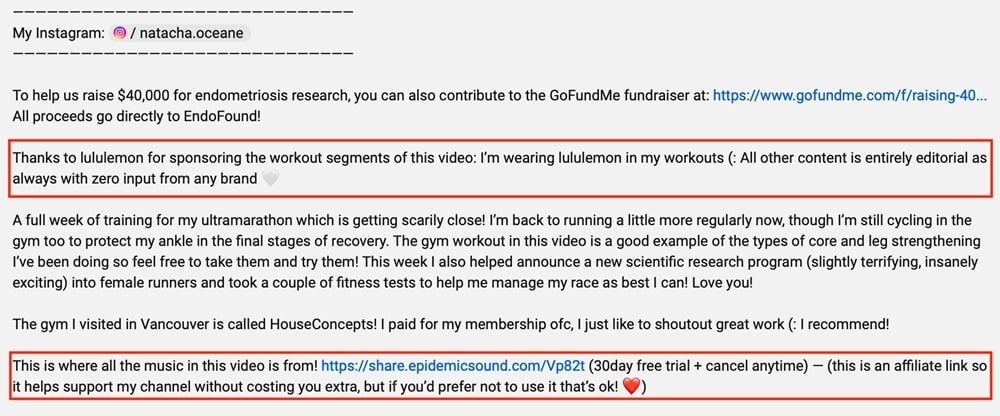
First, there's a disclaimer that a clothing brand sponsored certain parts of the video. This is followed by clarification that there's no other brand partnership in the content. It's helpful to clarify this, especially when the influencer frequently works with multiple brands.
Then, she highlights an affiliate link (which is clickable in the description). She clearly explains the terms (free trial with the right to cancel at any point) and emphasizes that it won't cost the viewer anything to click the link.
However, it makes it clear that her opinion of the provider (Epidemic Sound) could be biased due to her affiliations. This is the goal of any social media disclaimer: transparency while helping to avoid and reduce potential legal disputes down the line.
Employee Guidelines
If you have a social media disclaimer policy for your employees, you need to establish rules of conduct around what they can and can't say, and how violations will be addressed.
Capgemini, for example, has a comprehensive "Code of Conduct" for how employees should conduct themselves online and what they should consider when posting on social media:

The emphasis is on protecting the brand and promoting transparency. Employees must declare their relationship with Capgemini but also make it clear that their opinions are their own, not the company's:

The Code of Conduct explains that employees could be fined or disciplined for breaking the social media guidelines. This is helpful because it leaves employees in no doubt as to the company's social media policy and what disclaimers they must use if they don't want to face sanctions.
No Professional Relationship Established
Let your social media account viewers know that simply by following your account, viewing your content, interacting in comments sections or engaging in other ways, there is no professional relationship established between you and them.
James Shack, for example, is a financial adviser. However, his disclaimer clearly states that he does not offer financial advice through YouTube and that he's not responsible for financial decisions viewers make after watching his content. He also clearly dissociates himself from his employer:
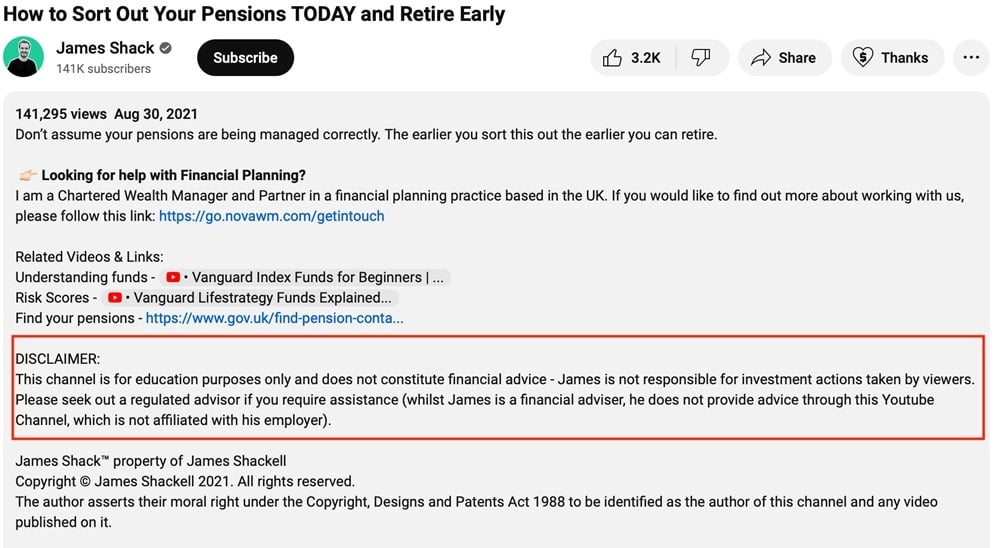
Limitations on Warranty and Liability
Social media disclaimers should emphasize that a business can't be held liable for harm caused by a viewer acting on the content. In other words, you don't warrant that the content is accurate or suitable for that person.
For example, the Psychiatry and Psychotherapy Podcast emphasizes that there's no guarantee regarding content accuracy, or that the content meets a medical or legal definition of standard of care:

It's also clear that there's no doctor-patient relationship established by sharing content online or on social media.
How Should a Social Media Disclaimer be Displayed?

As mentioned, there are various places you might display a disclaimer to ensure that it's legally enforceable. Let's briefly look at some of these examples.
Alongside a Social Media Post
Place disclaimers alongside your social media content, whether it's within the content or in the description below.
Franklin Resources, for example, has short but clear disclaimers and assertion of copyright under its YouTube videos:

On a Separate Social Media Disclaimer Page
You may have your own dedicated social media disclaimer page on your website. Harvard Medical School has a comprehensive disclaimer distancing itself from liability for video content:
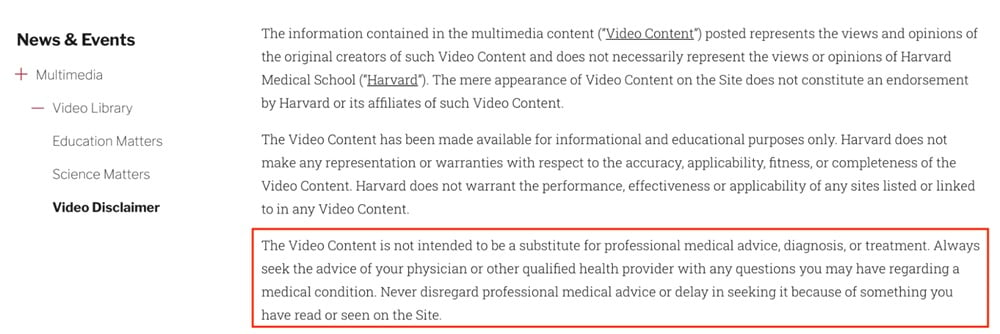
And Franklin Resources has a significant social media policy page, helping employees understand their obligations and how to use platforms such as LinkedIn responsibly:
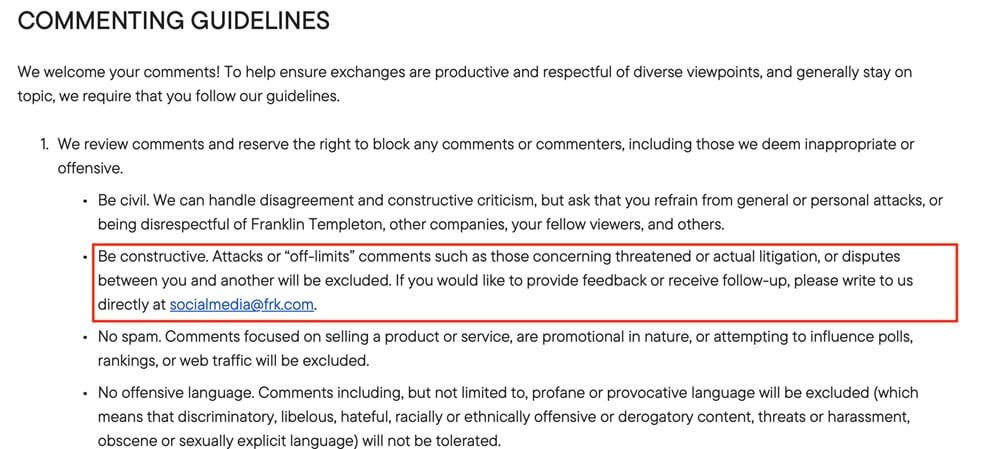
And, helpfully, when you click on a link to their social media platforms, a popup appears, confirming that views expressed may not reflect Franklin Resources or its affiliates:
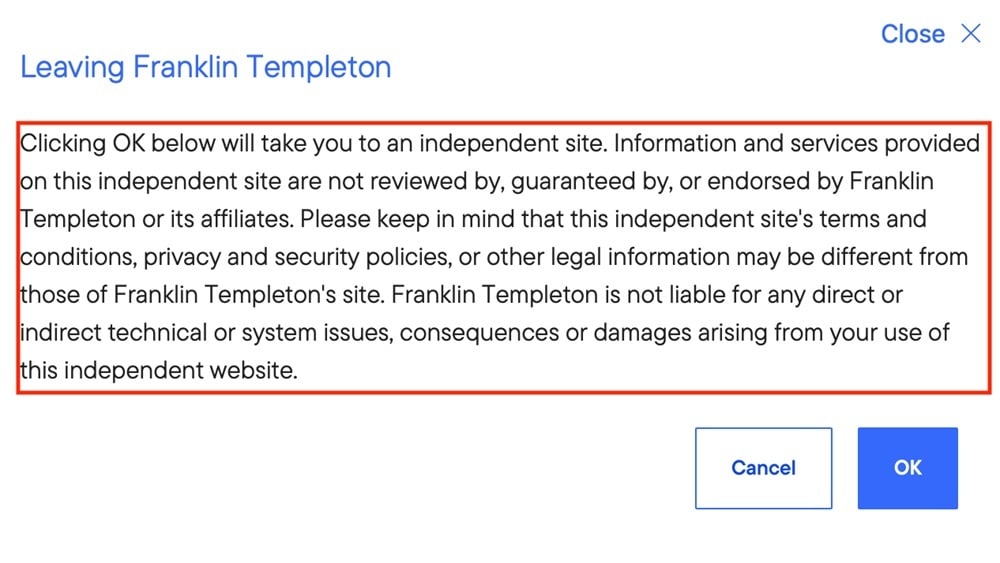
It's always smart to emphasize social media disclaimers in this way. The further you can distance your business from potentially problematic social media posts or comments, the better you can protect yourself commercially.
Within Social Media Profiles
If you have a social media page or profile, you can include a disclaimer within the profile itself. It can be short, such as "All opinions are my own," but it should be clear.
Dr. Eli David, for example, clearly disassociates his X posts from his business:
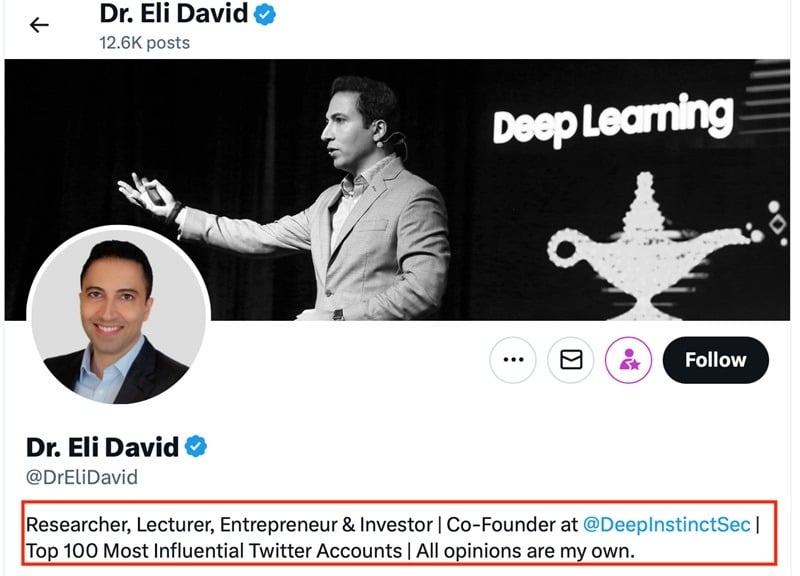
Summary
Social media disclaimers limit liability for comments, opinions, and views expressed online. They are essential if there's a risk that a member of the public could be influenced or harmed by content posted on social media.
Social media disclaimers may not be legally required. However, you may be legally required to disclose, for example, affiliate links. Despite not being legally required, you may benefit from a disclaimer if you:
- Offer legal advice
- Provide financial advice
- Work in the medical profession and post online
- Have affiliate marketing connections or post sponsored content
Social media disclaimers can be used to limit liability for comments made by your employees. It's also helpful to have a social media policy that outlines your employees' obligations when they post online (which could include, for example, having a disclaimer).
Social media disclaimers should be highly visible so that viewers know they should not rely on the content or take it as being representative of a company as a whole. Common places to post such disclaimers are within social media posts, within profiles, and on dedicated company legal policy pages.
